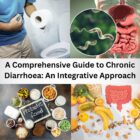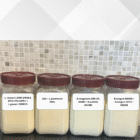Integrative Approach for PCOS
Polycystic Ovarian Syndrome (PCOS) is the most common endocrine and metabolic disorder among women in the reproductive years (18-44). If not managed earlier can lead to severe other lifestyle diseases. This blog will try to decode symptoms, causes, risk factors, integrative approach, and support related to PCOS.
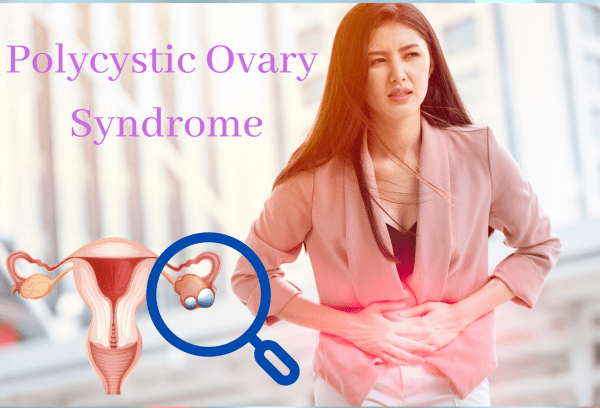
What Is PCOS?
Polycystic Ovary Syndrome (PCOS) is one of the most common endocrine system disorders. It represents a condition in which small cysts develop on one or both ovaries. This may lead to many abnormalities like Obesity, Infertility, and on-time treatment can avoid severe life-threatening diseases like Cancer and Cardiovascular Diseases.
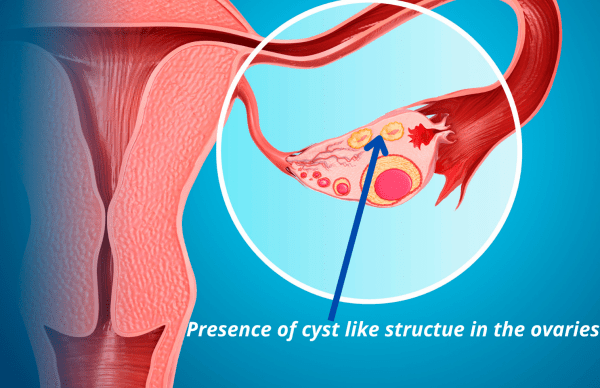
PCOS can cause infertility in women as it prevents ovulation and, if conceive with PCOS conditions, there is a higher chance of miscarriage, gestational diabetes, and premature delivery.
Sign And Symptoms Related To PCOS
The sign and symptoms of PCOS generally develop at puberty or some-time in the mid or late 20s. These symptoms may vary from person to person and, a diagnosis of PCOS is made when any of these mentioned 3-4 symptoms develop.
- Ovarian Cyst
- Irregular or missed period
- Acne and other skin problems
- Abdominal Obesity
- Infertility or trouble in conceiving
- Low sex drive
- Depression and mood swings
- Insulin resistance one of the major factor (Kindly read my previous detailed blog)
- Fatigue
- High Androgen and testosterone (male hormone) level
- Excessive facial and body hair growth (Hirsutism)
- Male pattern baldness
- Excess Androgens
- Pelvic Pain
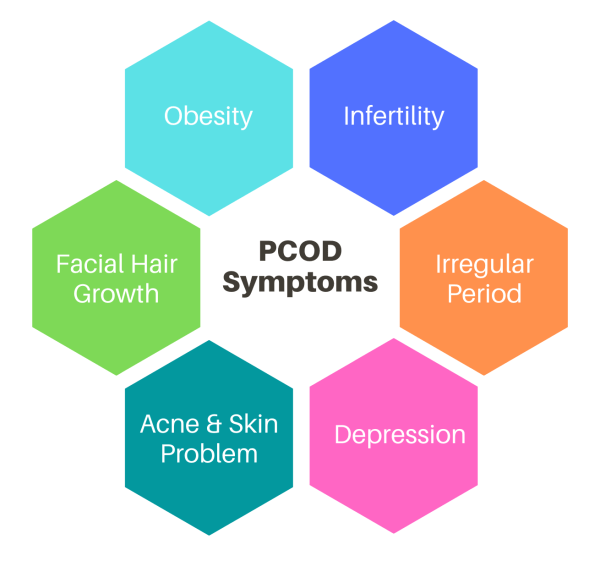
Causes For PCOS
Though there are no specific causes are known yet. Some factors play a crucial role in ovarian health.
Genetic Factors-
It is believed that genetic factors can play a vital role in PCOS conditions as research shows that polycystic ovary syndrome affects family generations.
Excess Androgen-
- Studies show that higher Androgen hormone secretion prevents ovulation and disturbing the menstrual cycle.
- According to some research, Clostrium Scindens a microbe that causes a change in primary bile acid and converts it to toxic bile acid.
- This Clostrium Scindens is also responsible for converting glucocorticoids to Androgen, and causes higher levels of Androgen.
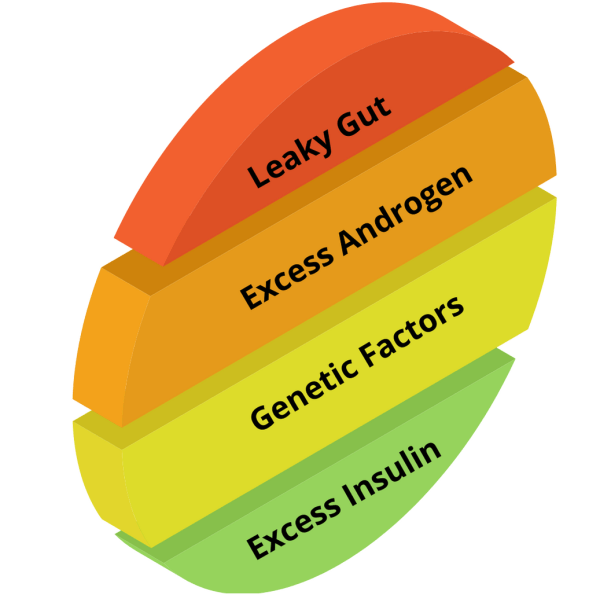
Leaky Gut-
- Gut has good bacteria (Akkermansia) and bad bacteria and our Gut plays a crucial role in balancing hormones, reducing inflammation and optimize overall health.
- However leaky Gut or Dysbiosis is a condition where good bacteria left in less amount as the result the lining of the intestine (microbiome) get destroyed that causes Inflammation, Insulin resistance and PCOS.
- The Estrobolome, is a group of bacteria present in the gut, that influences in estrogen hormone metabolization and can lead to hormonal imbalance conditions such as PCOS and endometriosis.
Insulin Resistance-
Higher insulin levels lead to Insulin resistance, which is also linked to the excess Androgen level and hamper ovulation. Increased level of Insulin also generates inflammation.
The usual range of glucose in the blood is considered as – Before Meal – 80-120 mg/dl
2 Hours after Meal – 130-140 mg/dl (Less than 20 points increase from baseline)
Associated Health Hazards
Untreated PCOS may lead to several health risk factors. Some are included-
- Diabetes type-2
- High Cholesterol
- High Blood Pressure
- Obesity
- Abnormal Uterine Bleeding
- Fatty Liver
- Metabolic Syndrome
- Depression and Anxiety
- Sleeping Disorder/Insomnia
- Hypothyroidism
- Infertility
- Women with prolonged PCOS conditions are at risk of developing severe diseases like gestational diabetes, pregnancy complications/preeclampsia.
Integrative Approach To Manage PCOS
It is essential to understand that PCOS can be cured and reversed, and, It can be managed in different ways. Some include-
- Integrative Nutrition and Lifestyle
- Key Supplements
Integrative Nutrition and Lifestyle
- Eating healthy and balanced diet that includes plenty of seasonal fruits and vegetables.
- Anti-inflammatory diet with low glycemic index foods, fiber and prebiotic fiber to rebalance healthy microbiome.
- Diet is supporting Thyroid, balance of other hormones, adrenals and omega-3 rich foods, 1-2 small servings of organic soy-rich foods.
- Crowd out white sugar to date, sugar, raw jaggery to reduce excess Insulin and Androgen level in the body.
- Completely eliminating the processed food from your plate, as it has added sugar, refined carbohydrates, low in fiber and nutrients which is not good for health.
- Cooking in organic A2 ghee rather than refined oil and seed oil. Sesame, mustard oil can be used in moderations.
- Botanical herbs support such as cinnamon, licorice root, berberine, grape seed extract, holy basil, St. John’n Wort.
- Reducing exposure to Endocrine Disrupters.
- Maintaining a healthy weight to reduce the chance of getting diabetes and heart-related problem.
- Stress management with optimal Vit D3, adaptogenic herbs, probiotics, breathing exercises.
- Good and restorative deep sleep to heal internally.
- Intermittent fasting to reverse Insulin Resistance.
- Complimentary Healing approaches like Acupuncture to decrease sympathetic activity and stress.
- Mind-body approach such as self-care, cognitive-behavioral therapy to reduce stress, anxiety and depression symptoms.

Key Supplements
- Folic Acid, Vitamin B6, and, Vitamin B12 are extremely crucial for hormonal balance.
- Vitamin D and Calcium intake improve menstrual health and reduce abnormalities.
- Omega-3 to manage inflammatory components.
- Zinc improves fertility. It also reduces unwanted hair growth and alopecia. Zinc is anti inflammatory and lowers inflammation.
- Probiotic are not only helps in digestion, and gut health. Probiotic supplements also regulate the menstrual cycle, reduces androgen production and promotes insulin resistance. Pendulum Glucose Control and Bioti Quest’s Meet Sugar Shift are some effective probiotic supplements that promote the growth of Akkermansia Bacteria in the intestine and maintain the gut microbiome and improves bowel regularity.
- L-Glutamine is an amino acid that helps to improve gut health.
- Magnesium regulates insulin function and also improves estrogen metabolism.
- ALA rich diets such as flax seeds support estrogen elimination.
- Selenium (through diet- such as Brazilian nut) supports anti-oxidant reactions and to balance Insulin.
- Chromium and Inositol to improve insulin sensitivity.
Conclusion
PCOS is a serious health condition, but on-time treatment under medical practitioners and the Integrative nutrition approach can reduce the risk of severe complications. Kindly visit your doctor if you have any PCOS symptoms and discuss in detail the necessary supplements and diet to support you.



